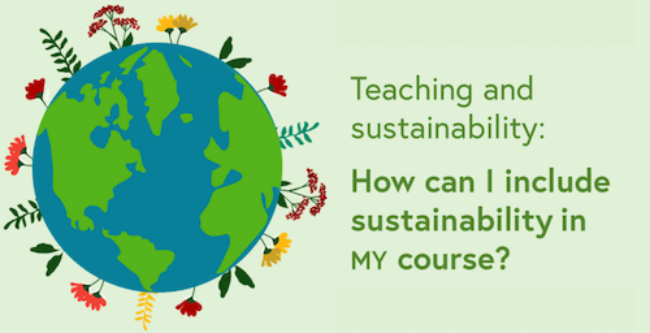
Sustainability Teaching Resources
Teaching Resources on climate change, sustainability, and environmental justice
-
Project Drawdown: Six-part video course and other “Learn” resources
-
Since the 2017 publication of the New York Times bestseller Drawdown, the nonprofit organization “Project Drawdown” has emerged as a leading resource for information and insight about climate solutions offered by an international coalition of leading researchers, scientists and policymakers. The Drawdown Learn™ initiative offers a six-part educational video series focused on solutions. It also includes leads to other resources that encourage education and learning about climate solutions based on Project Drawdown’s research, analysis, and insights.
-
AASHE Course materials, searchable by topic
-
The Association for the Advancement of Sustainability in Higher Education (AASHE) has created a course materials library that showcases assignments, exercises, presentations, syllabi and other learning materials related to sustainability. SU is a member of AASHE. All SU faculty, staff and students can sign up with their "seattleu.edu" email to access the AASHE resources. Contact CEJS at cejs@seattleu.edu if you have any problem logging in.
-
Factsheets by the University of Michigan Center for Sustainable Systems
-
The University of Michigan’s Center for Sustainable Systems has developed since 2001 a growing set of factsheets that cover topics including energy, water, food, waste, buildings, materials, and transportation systems. Each factsheet presents important patterns of use, life cycle impacts and sustainable solutions. They are designed to inform policymakers, business professionals, students and teachers. The factsheets are peer-reviewed and updated annually. The 2021 edition contains more than 2226 facts and 135 graphics compiled from 995 sources.
-
Teaching collections from the Solutions Journalism Network
-
These collections of solutions journalism stories were specially curated for educators or community leaders to use within groups of students, citizens, and changemakers. Each collection includes five or more stories, a description, discussion questions and notes. Topics include the UN Sustainable Development Goals; building racial equity; Project Drawdown's 100 Solutions to Reverse Global Warming; pandemic responses; and more.
-
#MAKECLIMATEACLASS with these toolkits
-
Bard College’s Center for Environmental Policy has created teacher guides to integrate climate change, climate solutions, and climate justice into YOUR course. Teaching Film? Music? Art? English? Business? Theater? Spanish? Sociology? Find your teacher guide and Make Climate a Class.
-
Study Guide - Faith for Earth: A Call for Action
-
The Center for Ecumenical and Interreligious Engagement at Seattle University is offering the "Faith for Earth: Call for Action" Study Guide as a Canvas course. The guide was created by the Parliament of the World's Religions and the United Nations Environmental Program, Faith for Earth Initiative.
-
En-Roads Simulation Tool
-
En-ROADS is a free simulation model from Climate Interactive made for exploring how to address global climate challenges through large-scale policy, technological, and societal shifts. You can create scenarios that focus on how changes in taxes, subsidies, economic growth, energy efficiency, technological innovation, agriculture, population, carbon pricing, fuel mix, etc. will change global carbon emissions and temperature. It is designed to be used interactively with groups where it can be the basis for conversations around addressing climate change and how to limit future global warming following the Paris Agreement. There are also pre-made class activities and facilitator guides available.
-
SERC's Portal to Resources for Faculty, Departments and Institutions
-
This portal from the Science Education Resource Center at Carleton College is a collection of resources under categories such as improving teaching & learning, sustainable institutional change, how to broaden STEM participation, and more. These resources are aimed at higher ed faculty, program leads, department chairs, and learning centers.
-
Science-Based Choices for Climate Action - Recordings
-
Recordings from a Dickinson College symposium (October 2022) are now available! Science-Based Choices for Climate Action - Insights from the IPCC 6th Assessment Report featured 50 speakers from a dozen countries and discussed climate change science, risks, policies, and actions. You can watch the recordings here.
-
Environmental Justice Teaching Resource (EJTR)
-
The Center for Environmental Justice and Sustainability, through the research efforts of CEJS Faculty Fellow Dr. Trileigh Tucker, manages this Environmental Justice Teaching Resource (EJTR). For information about adding your course reflections and syllabi to the database, please contact the Center for Environmental Justice and Sustainability at cejs@seattleu.edu.
